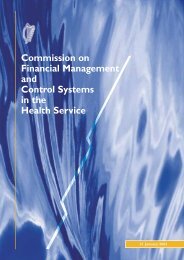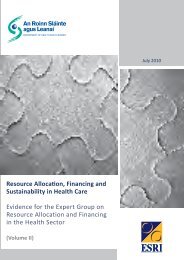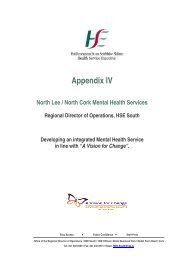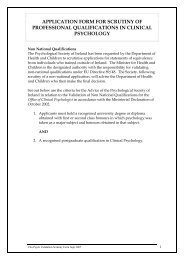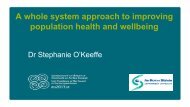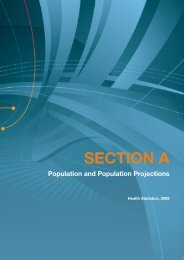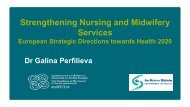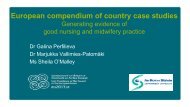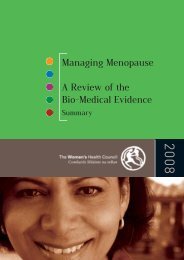All Ireland Traveller Health Study Our Geels - Department of Health ...
All Ireland Traveller Health Study Our Geels - Department of Health ...
All Ireland Traveller Health Study Our Geels - Department of Health ...
Create successful ePaper yourself
Turn your PDF publications into a flip-book with our unique Google optimized e-Paper software.
<strong>All</strong> <strong>Ireland</strong> <strong>Traveller</strong> <strong>Health</strong> <strong>Study</strong><br />
<strong>Traveller</strong>s <strong>Health</strong>: A National Strategy 2002 - 2005<br />
This strategy is very significant in that it represents a change in national policy towards <strong>Traveller</strong>s. It<br />
firstly recognises <strong>Traveller</strong>s as a distinct minority group in Irish society with a health status far below the<br />
general population and having specific health needs.<br />
‘<strong>Traveller</strong>s are particularly disadvantaged in terms <strong>of</strong> health status and access to health services. Generally<br />
speaking, they suffer poor health on a level which compares so unfavourably with the settled community that<br />
it would probably be unacceptable to any section there<strong>of</strong>’ (<strong>Department</strong> <strong>of</strong> <strong>Health</strong> and Children, 2002).<br />
The strategy contains 122 actions that were to be implemented over a 4-year period, from 2002 to<br />
2005. To date, some <strong>of</strong> the key recommendations that have been implemented are the establishment<br />
<strong>of</strong> the national and regional <strong>Traveller</strong> <strong>Health</strong> Structures, which have facilitated the development <strong>of</strong><br />
<strong>Traveller</strong> <strong>Health</strong> initiatives at local level. It recognises the role that primary healthcare projects have had<br />
in addressing <strong>Traveller</strong> health issues and it recommends their replication throughout the country.<br />
‘Primary healthcare for <strong>Traveller</strong> Projects will be developed in conjunction with <strong>Traveller</strong> organisations in<br />
all <strong>Health</strong> Board areas where there is a significant <strong>Traveller</strong> population by the end <strong>of</strong> 2005’ (<strong>Department</strong> <strong>of</strong><br />
<strong>Health</strong> and Children, 2002).<br />
Since 2002, 40 PHCTPs have been established around the country and they have trained more than 300<br />
<strong>Traveller</strong> women as TCHWs.<br />
National Drugs Strategy (NDS) (interim) 2009-2016<br />
The National Drugs Strategy acknowledges the concerns over the growing problem drug use. Data<br />
is not available to indicate the number <strong>of</strong> <strong>Traveller</strong>s who present for treatment as heret<strong>of</strong>ore <strong>Traveller</strong>s<br />
have not been recorded as a distinct group under the National Drug Treatment Service (NDTRS)<br />
(<strong>Department</strong> <strong>of</strong> Community, Rural and Gaeltacht Affairs, 2009).<br />
However, in research commissioned by the National Advisory Committee on Drugs (NACD), Fountain<br />
(2006) found that the prevalence pattern broadly mirrors that <strong>of</strong> the general population, with cannabis,<br />
sedatives and tranquillisers most commonly used, followed by cocaine, ecstasy and lastly, heroin.<br />
The issues experienced by <strong>Traveller</strong>s in relation to drugs are entwined with issues <strong>of</strong> inequality and<br />
marginalisation. This means that <strong>Traveller</strong>s are more likely to be exposed to the risk factors that lead to<br />
problem drug use. It also implies that response mechanisms to address the associated problems need<br />
to factor in these issues. There are heightened concerns within the <strong>Traveller</strong> community about the<br />
growth in problem drug use. This is also acknowledged by the HSE as a key and growing concern. The<br />
NDS also acknowledged that <strong>Traveller</strong>s face specific problems that stem from a ‘lack <strong>of</strong> awareness <strong>of</strong> the<br />
existence and nature <strong>of</strong> drug services, lack <strong>of</strong> formal education, stigma and embarrassment, and lack <strong>of</strong><br />
culturally appropriate provision’ (Fountain, 2006).<br />
20



